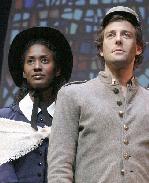SITE GUIDE
SEARCH
ADVERTISING AT CURTAINUP
REVIEWS
FEATURES
NEWS
Etcetera and
Short Term Listings
LISTINGS
Broadway
Off-Broadway
NYC Restaurants
BOOKS and CDs
OTHER PLACES
Berkshires
London
California
New Jersey
Philadelphia
Elsewhere
QUOTES
TKTS
PLAYWRIGHTS' ALBUMS
LETTERS TO EDITOR
FILM
LINKS
MISCELLANEOUS
Free Updates
Masthead
Writing for Us
A CurtainUp Los Angeles Review
Atlanta
| Is my brother crying?— Paul
|

JoNell Kennedy as Atlanta
(R) Ken Barnett as Paul in Atlanta
|
Co-written with Adrian Pasdar, it has interesting characters and some dramatic situations, though others don't rise above cliches, and the second act in particular lumbers without sustained suspense. This is no fault of co-directors Pasdar and Randall Arney, the Geffen's Artistic Director, who bring their characters to colorful and exciting life, abetted by Kay Cole's musical staging.
Set in the waning days of the Civil War in 1864 as Confederate troops retreat from Sherman's army, it follows the physical perils and emotional discoveries of Paul (Ken Barnett), a Union soldier trapped behind enemy lines. To survive he swaps uniforms with a Confederate soldier he has just killed. In the man's pocket are love letters from his sweetheart Atlanta (JoNell Kennedy). Paul falls in love with the woman through her words. In a novel twist on the Cyrano theme, he's told by the actress Cleo to express himself in his own words rather than borrowing another's. Amazingly he finds them.
Paul falls in with Louisiana soldiers led by Colonel Medraut (John Fleck), so obsessed by Shakespeare that he's trained the slaves who accompany him to perform the plays. Their leading man Hamlet (Leonard Roberts) was raised on Medraut's plantation. Leading lady Cleo (Merle Dandridge), a very light-skinned elegant beauty, was the mistress of a wealthy man. Puck (Moe Daniels) is a girl raised in the woods who thinks she's a boy. Lt. Virgil (Travis Johns) is the Colonel's illiterate bullying adjutant.
Hamlet persuades the Colonel to let Paul be part of the acting troupe. It's a stretch but, like the letters he writes to Atlanta, a learning process. The play covers racial and military issues with varying degrees of originality. The Colonel's belief in segregation doesn't extend to his bedroom where he uses Cleo regularly. The most dramatic scene centers on the whipping of Hamlet by the Colonel. When Paul protests, he is forced to do it.
The Shakespearean theme works well, both as an illustration of how some plantation owners used their slaves and felt about them, and as an opportunity for Hummon to set sonnets and soliloquies to music which he does with supple grace. He also incorporates period songs, such as "Dixie" and"Oh, Susannah!" into his rollicking bluegrass, country and blues score.
The actors all have strong voices. As Paul, Ken Barnett projects a young soldier with unaffected lyricism. One would like to hear more of the rich vibrant tones of Moe Daniels's Puck. Fleck plays the Colonel as a half-mad Cavalier on the losing side whose love of Shakespeare is at odd variance with the brutal racist beliefs of a plantation slave-owner. Leonard Roberts plays Hamlet with smoldering power and Merle Dandridge's grace illuminates Cleo. The mysterious figure of Atlanta is restricted to singing mournful ballads from one spot on center stage, but Kennedy knows how to sell a song.
The backdrop of changing photos of Civil War scenes in John Arnone's set can be more distracting than enriching in a production that has trouble enough holding the audience. Debra McGuire's costumes are theatrical and evocative.
In his program note, Producing Director Gilbert Cates writes that the Geffen is "pleased to be yet another step in the process of bringing this play to life." Though by no means a flawless finished product, the material justifies Cates' judgement in developing it.
|
ATLANTA Book by Marcus Hummon and Adrian Pasdar; Music & Lyrics by Marcus Hummon Director: Randall Arney and Adrian Pasdar Cast: John Fleck (Colonel Medraut), Ken Barnett (Paul), Moe Daniels (Puck), Leonard Roberts (Hamlet), Travis Johns (Lt. Virgil), Merle Dandridge (Cleo), JoNell Kennedy (Atlanta) Set Design: John Arnone Lighting Design: Daniel Ionazzi Costume Design: Debra McGuire Musical Staging: Kay Cole Sound Design: Brian Hsieh Running Time: Two hours, 10 minutes, one intermission Running Dates: November 28, 2007-January 6, 2008. Where: Geffen Playhouse, 10886 LeConte Avenue, Los Angeles. Reservations: (310) 208-5454 Reviewed by Laura Hitchcock on November 29. |

Easy-on-the budget super gift for yourself and your musical loving friends. Tons of gorgeous pictures.

Leonard Maltin's 2007 Movie Guide

 >
>

